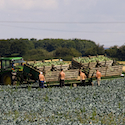Crowdfunding the Future of Food
How many great ideas for starting or expanding small community-based food businesses have gone languishing for lack of access to capital – even relatively small amounts? One of the frustrations in growing our regional food economies has been the Securities and Exchange Commission (SEC) rules preventing most Americans (all but the richest 2%) from investing in small, local enterprises.
Unless a business can afford $50,000 to $100,000 (or more) to spend on lawyers to prepare private placement memoranda or public offerings, it is effectively prohibited from soliciting funds from private investors in return for a stake in the business. Yet, often it is a budding entrepreneur’s friends, family and community who would love to pitch in to help launch a local company.



